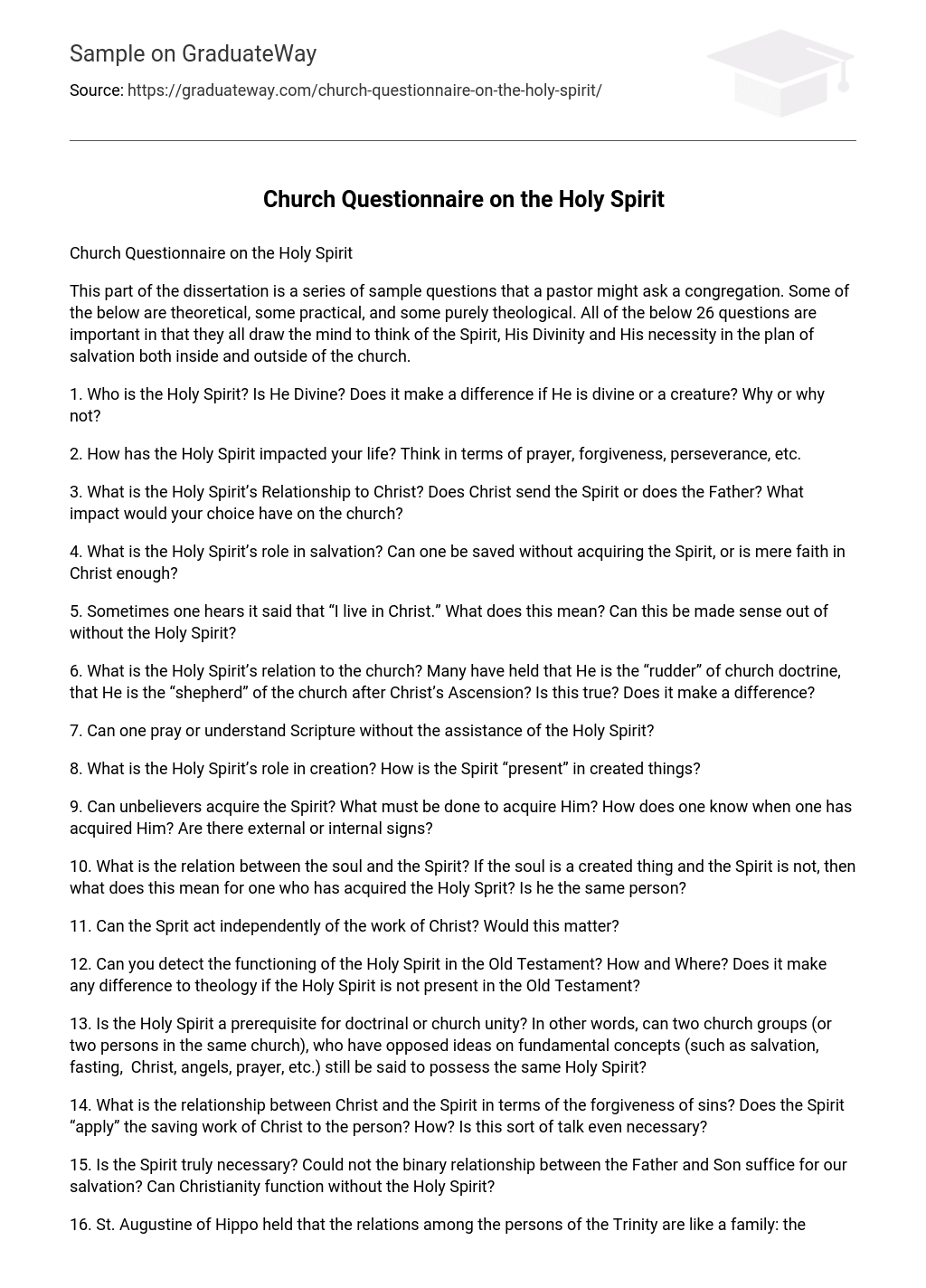This part of the dissertation is a series of sample questions that a pastor might ask a congregation. Some of the below are theoretical, some practical, and some purely theological. All of the below 26 questions are important in that they all draw the mind to think of the Spirit, His Divinity and His necessity in the plan of salvation both inside and outside of the church.
1. Who is the Holy Spirit? Is He Divine? Does it make a difference if He is divine or a creature? Why or why not?
2. How has the Holy Spirit impacted your life? Think in terms of prayer, forgiveness, perseverance, etc.
3. What is the Holy Spirit’s Relationship to Christ? Does Christ send the Spirit or does the Father? What impact would your choice have on the church?
4. What is the Holy Spirit’s role in salvation? Can one be saved without acquiring the Spirit, or is mere faith in Christ enough?
5. Sometimes one hears it said that “I live in Christ.” What does this mean? Can this be made sense out of without the Holy Spirit?
6. What is the Holy Spirit’s relation to the church? Many have held that He is the “rudder” of church doctrine, that He is the “shepherd” of the church after Christ’s Ascension? Is this true? Does it make a difference?
7. Can one pray or understand Scripture without the assistance of the Holy Spirit?
8. What is the Holy Spirit’s role in creation? How is the Spirit “present” in created things?
9. Can unbelievers acquire the Spirit? What must be done to acquire Him? How does one know when one has acquired Him? Are there external or internal signs?
10. What is the relation between the soul and the Spirit? If the soul is a created thing and the Spirit is not, then what does this mean for one who has acquired the Holy Sprit? Is he the same person?
11. Can the Sprit act independently of the work of Christ? Would this matter?
12. Can you detect the functioning of the Holy Spirit in the Old Testament? How and Where? Does it make any difference to theology if the Holy Spirit is not present in the Old Testament?
13. Is the Holy Spirit a prerequisite for doctrinal or church unity? In other words, can two church groups (or two persons in the same church), who have opposed ideas on fundamental concepts (such as salvation, fasting, Christ, angels, prayer, etc.) still be said to possess the same Holy Spirit?
14. What is the relationship between Christ and the Spirit in terms of the forgiveness of sins? Does the Spirit “apply” the saving work of Christ to the person? How? Is this sort of talk even necessary?
15. Is the Spirit truly necessary? Could not the binary relationship between the Father and Son suffice for our salvation? Can Christianity function without the Holy Spirit?
16. St. Augustine of Hippo held that the relations among the persons of the Trinity are like a family: the mutual love of the Father and Son beget the Spirit, and the Sprit is the very vehicle of that love. Does this make sense? Does this in any way help to understand the Trinity?
17. What is the difference between sanctification and justification? Does the Holy Spirit have a role in either?
18. In what respect(s) can the Holy Spirit be called the “spirit of Christ” and the “Spirit of the Father?” Can he “belong” to both in any meaningful way?
19. Can the Holy Spirit have any role in new revelations to the faithful?
20. What do you think of the nature of the relation between the Holy Spirit and the writing of Scriptures? In other words, what does “inspiration” or “inspired” mean in this context? Is this the Spirit’s work? And more specifically, how does the Spirit “inspire” the writers of Scripture to write?
21. Can one prove the existence of the Holy Spirit? In other words, given God’s existence, is the Holy Spirit necessary, does it derive from the very nature of God Himself to have such a Spirit?
22. In Scripture, the Holy Spirit is referred to as the “comforter,” and occasionally, as the “accuser.” What does this mean to the church today? What does it mean to you as a person? Can the Spirit be both these things at the same time?
23. Many speak of the end times, or the “consummation of all things.” What is the Spirit’s role in the end times, or the end of the world? For example, could the Spirit warn the elect that the time is coming? Even more, do you see the Spirit working in the Book of Revelation itself?
24. What is the Holy Spirit’s role in the Annunciation of Mary? Mary was told that she would conceive a son and call His name Jesus. Did the Holy Spirit “get her pregnant” with God?
25. And on a similar topic, what was the Spirit’s role in the resurrection? Did Christ raise Himself, or did the Spirit? Or the Father? And would it make a difference to the church either way?
26. Does it make sense for Christ to have spoken about a “new heavens and a new earth” without the power of the Spirit?





